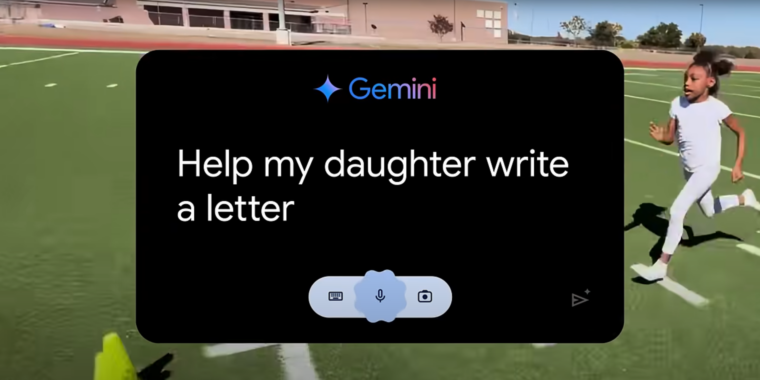If you’ve watched any Olympics coverage this week, you’ve likely been confronted with an ad for Google’s Gemini AI called “Dear Sydney.” In it, a proud father seeks help writing a letter on behalf of his daughter, who is an aspiring runner and superfan of world-record-holding hurdler Sydney McLaughlin-Levrone.
“I’m pretty good with words, but this has to be just right,” the father intones before asking Gemini to “Help my daughter write a letter telling Sydney how inspiring she is…” Gemini dutifully responds with a draft letter in which the LLM tells the runner, on behalf of the daughter, that she wants to be “just like you.”
I think the most offensive thing about the ad is what it implies about the kinds of human tasks Google sees AI replacing. Rather than using LLMs to automate tedious busywork or difficult research questions, “Dear Sydney” presents a world where Gemini can help us offload a heartwarming shared moment of connection with our children.
Inserting Gemini into a child’s heartfelt request for parental help makes it seem like the parent in question is offloading their responsibilities to a computer in the coldest, most sterile way possible. More than that, it comes across as an attempt to avoid an opportunity to bond with a child over a shared interest in a creative way.



Ah, yes. I’m mostly on the receiving side of such and haven’t had much luck in relationships, but getting ghosted after a few forced words, uneasy looks, maybe even kinda hurtedly-mocking remarks about my personality that I can’t change is one thing, it’s still human, though unjust, but OK.
While a generated letter with generated reasons and generated emotions feels, eh, just like something from the first girl I cared about, only her parents had amimia, so it wasn’t completely her fault that all she said felt 90% fake (though it took me 10 years to accept that what she did actually was betrayal).